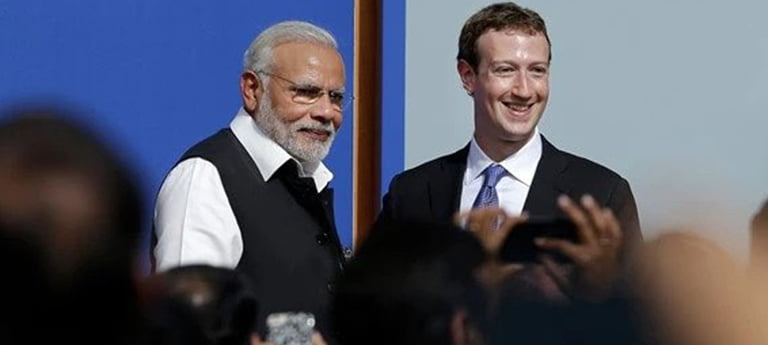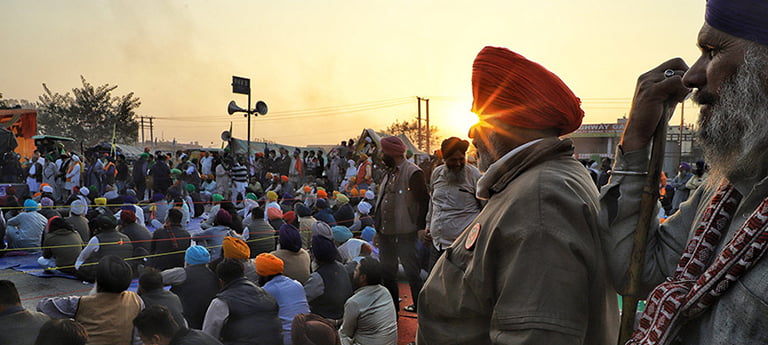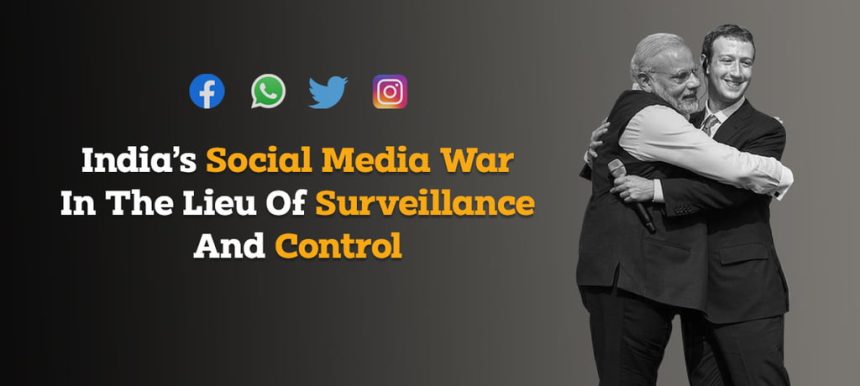Social Media is a tool, platform, and stage for all those who want their voices heard. Meanwhile, the same tool has been used by activists, movements, governments, agencies, etc, to create waves of change. One such recent example is of the resistance movement that came from Palestine and spread like wildfire over the whole social media sphere. With social media’s impact on societies in creating understandable tensions. The concern is that these tensions will be used as a pretext to restrict freedom of expression, converting social media platforms from being stages that enable immeasurable voices to reach immeasurable audiences into platforms that allow only a few powerful voices to reach colossal numbers of people.
These tensions are now transforming into a war between the government and social media companies in India, a country with over 600 million internet users and the largest market by user numbers for both Google and Facebook.
What is happening in India, the largest democracy in the world does not seem much different from what’s happening in Russia, where the social media sites are under a lot of pressure to erase anything that the government regards to be in violation of the “law”. These days seem to be super dark for freedom of expression in India. According to the Human Rights Watch report in 2020, journalists were targeted for having criticized the government’s pandemic response. India also has the most internet blackouts in the world, with 80 percent of them in Jammu and Kashmir. Amnesty International was forced to discontinue activities in the country in September 2020.
Indian Government’s Information Technology (Intermediary Guidelines and Digital Media Ethics Code) Rules 2021 is intended to address “disturbing developments” including fake news, distorted images of women, and abusive language, as well as crime, terrorism, and incitement to disturb public order. The new social media guidelines compel social media platforms to follow due diligence procedures to guarantee that they do not host unlawful content, and they also allow the government to warn platforms when a specific piece of material is prohibited. They also compel news and current affairs publishers to follow a code of ethics that will be supervised by the government. Furthermore, where appropriate for national security or crime prevention, social media networks must allow the government to track down the senders of specific private messages.

The rules have been widely criticized in India and around the world. In terms of social media platforms, at least two important human rights issues arise.
First, the restrictions on permissible content are broader than international law and India’s constitution allows for exceptions to freedom of speech, and the government’s discretion to declare information unlawful creates a risk of censorship of acceptable political debate by whichever political party is in power.
Second, the demand that messaging service providers break their end-to-end encryption in response to government requests in order to identify the original poster of messages may be in violation of the right to privacy.
The rules apparently not only pertain to controversy with regards to social media but also the digital media platforms. As Indian digital media organizations have said, “For the executive to have the absolute power to regulate the content of news portals or publications would be to strike not only at the constitutional scheme but at democracy itself.” As a result, Indian digital news sites, led by The Wire, have filed a lawsuit challenging the application of the new guidelines to digital news portals.
Moreover, on May 25, WhatsApp commenced its legal proceedings, claiming that the breaking of end-to-end encryption is contrary to the right to privacy enshrined in the Indian Constitution and would “effectively mandat[e] a new form of surveillance.” In these processes, the social media platform finds itself in the unique position of being the plaintiff, rather than the defendant, in a lawsuit brought by users or the government. Furthermore, WhatsApp brought its action with the goal of protecting its users’ privacy rather than defending its own corporate interests. The Indian government issued the second-highest number of requests for Facebook user data internationally in the second half of 2020, while Google reported a considerable increase in so-called national security takedown requests by India in 2020.

India’s electronics and information technology minister, Ravi Shankar Prasad, has branded WhatsApp’s legal action a “clear act of defiance” and urged the business to cooperate to preserve both privacy and national security at the same time. On a political level, the events contrast sharply with criticism leveled at Facebook, which owns WhatsApp, in 2020 for being too sympathetic to the Indian government for business reasons.
According to the new laws, large social media sites had until May 25 to nominate and provide contact information for Indian representatives. These representatives will be accountable for following the new standards and responding to complaints, and they may be held liable if they do not. Twitter did not fulfill the deadline in full, and the Delhi high court ordered it to comply on May 31 in response to a government petition, warning that non-compliance might result in the loss of status and protection as a platform user’s intermediary.
In a tweet on May 27, Twitter stated that it would “strive to comply with existing legislation in India” in order to keep its service operational, but that it would also “push for reforms to portions of existing restrictions that restrict free, open public discourse.” Google has stated its commitment to follow the standards, while also stating that it will disclose any steps it takes to do so in the interest of transparency. Facebook has also stated that it intends to comply with the law.
It would be interesting to see how the Indian courts respond to claims that the rules are incompatible with constitutional rights, as well as how the rules will affect social media in practice. Because the ideas at stake are complex, determining who is in the right in these disagreements is not an easy task. On the one hand, it is the prerogative of each national government to legislate for its own country’s public interest and local environment. Large social media platforms have yet to demonstrate that they are capable of providing proper content monitoring in all nations throughout the world. Lack of social media regulation has created an environment where illegal speech, such as hate speech, discrimination, encouragement to violence, and child abuse, can thrive.
Giving governments the capacity to control what people say, however, has been proved to be incompatible with maintaining freedom of expression, as it creates an almost overwhelming risk of censorship and abuse. Instead, the history of media regulation demonstrates that independent monitoring paired with responsible behavior by media platforms may create a free, diversified, and context-sensitive environment that is not oppressive.






